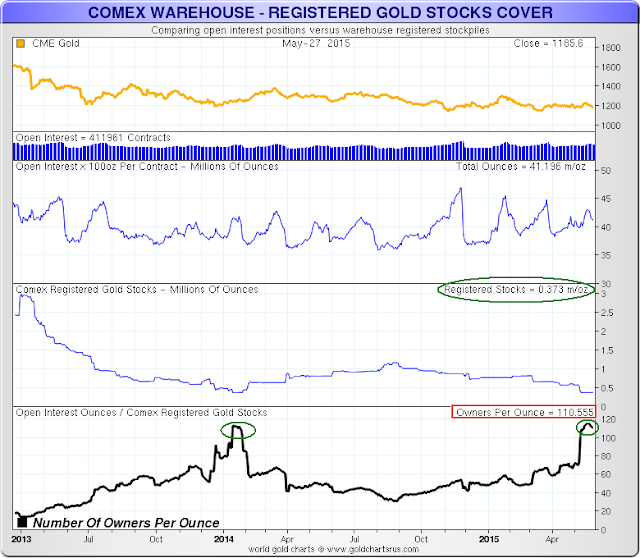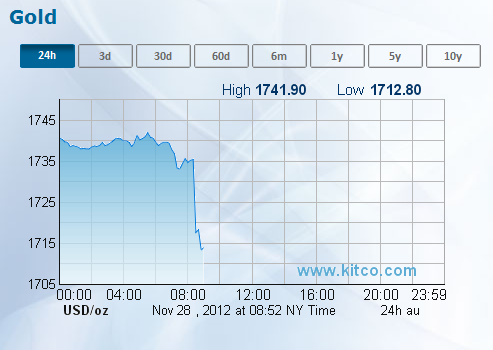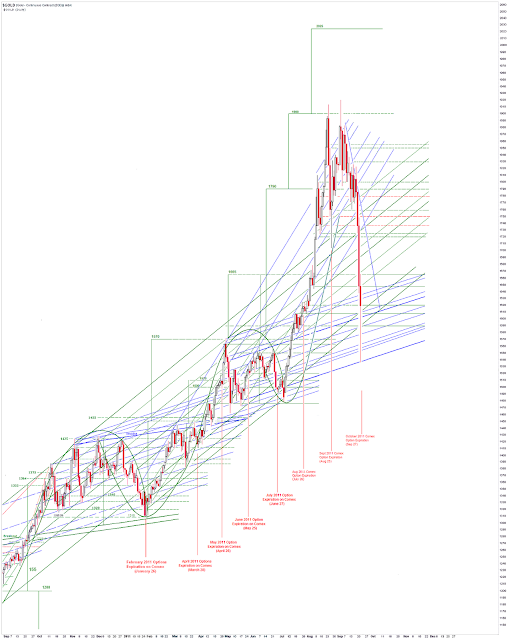"Corruption is a tree, whose branches are
of an immeasurable length: they spread
Everywhere; and the dew that drops from thence
Hath infected some chairs and stools of authority."
Beaumont and Fletcher, The Honest Man's Fortune
“In the eyes of the empire builders men are not men, but instruments”
Napoleon Bonaparte
"When I despair, I remember that all through history the ways of truth and love have always won. There have been tyrants, and murderers, and for a time they can seem invincible, but in the end they always fall. Think of it-- always...
First they ignore you, then they laugh at you, then they fight you, then you win."
Mohandas K. Gandhi
By way of introduction, Professor Antal Fekete defines the
gold basis as the difference between the price of gold in the nearest futures contract and the price of gold for immediate delivery.
In commodity trading
contango is the situation where the difference is positive, that is, there is a premium placed on the futures contract. In
backwardation, there is a negative difference, that is, one will
pay more for gold for immediate delivery than you will for the futures contract, or a promise of delivery.
Contango is the normal condition in most commodities because of the
time value of money or inflation. I think most are familiar with that concept. Think of it in terms of
Net Present Value. If something will become more valuable in the future because of inflation, it will cost more than the same object if possession is taken today, less any organic growth and dividends.
This is always tied in with the
risk free interest rate and the application of a
risk factor. If you have not seen the video called
Risk then you may wish to see it. Risk is just a calculation that estimates the probability that the underlying value of a thing will deviate from expectations without considering inflation, based on some change in fundamental valuation.
Now for some really good news. You can understand what Professor Fekete is saying without bothering about any of the theoretical. Academics like to think about this and Fekete is a deep thinker on the subject, and we are glad and grateful for his work. Theoretical work provides the planks and the plans out of which practical men like me build houses. But unless you have taken courses in Economics and Finance you probably are not as familiar with the mechanics of this.
But for most people it does not mean all that much because they do not care about the intellectual arguments and fine nuances of the professors because as non-specialists they lack the context to care or understand it. And academics like to argue the fine points of contention and sometimes with great passion like knights at a joust.
And unfortunately there is another class of academics who like complex and convoluted argument because it allows them to 'prove things,' that would otherwise be considered nonsense by anyone keeping an eye on the big picture, and especially matters of public policy. And they often bring shame on themselves and to their profession even if they may make quite impressive amounts of money in the process.
Also, and I am going to steer clear of discussing this, there is quite a bit of distortion introduced at the ZIRP event horizon, and one can get sucked into side arguments about this almost endlessly.
Instead you can think of basis as simply the divergence between the paper metal and physical metal markets with regard to price.
If there is a small and steady divergence, things are normal. If there is a large divergence where paper is worth more than physical, the expectations of future inflation are high and increasing. If there is a large divergence where the physical is more expensive than paper, then there is something odd going on.
That oddness can mean one of two things. First, it can be a signal of future deflation, and especially if the price of physical gold is dropping because of an excess of physical supply. Supply is key to watch as well as price, and people who do not study supply don't really know what they are talking about.
If there is a large divergence in which physical is more expensive than paper,
and the supply of physical is tightening, then you have that oddest of conditions where the futures market is grossly miscalculating things as they are and may be. And this is what has just happened.
There are several reasons for this. One primary reason is that some market participants who are predominant in the futures markets are acting on hidden information. This again could be several things, but it almost certainly involves the willful distortion of the markets for personal gain. This may or may not be technically illegal.
Remember the case of the very obvious and willful distortion of the European bond market by Citi some years ago? As you may recall, the FSA got involved and Citi was fined for dumping a huge amount of bonds into a quiet trading period to knock down the price and run the stops, grabbing a quick profit.
The FSA did not charge them with
market manipulation which is quite clearly what they did by any common sense judgement, but rather with
failing to observe orderly markets, which is what one might think of as a misdemeanor. What they really did wrong was to grab their profits from the wrong people, other insiders. It is similar to what even more recently happened in the case of the London Whale.
So when some regulator stand up and says that nothing 'illegal' is being done, they may be saying the same thing as the FSA was saying. That is, of course these jokers are bloody well batting the price around, but since no one of serious power is complaining, we can't do anything about it, since it fails to meet some difficult to prove considerations of intent and conspiracy within
the pathological environment of Wall Street.
So be that as it may, watching the divergence between paper and physical is paramount, while bearing in mind the lags. Markets are not quite uniform and instantaneous even in this age of marvels.
But there is little doubt in my mind that the recent antics in the metals markets were a price manipulation or a market operation with the intent to move the markets for some personal objective. It takes a willful effort not to see it that I could not undertake even if it was to my personal advantage. And I think when people haven't a leg to stand on they resort to name-calling and ridicule, because the facts are not their friends. And they need to keep their reputations in mind.
So in summary, a pre-meditated market operation used the futures market to knock down the price of gold and silver recently. This has resulted in greater buying of physical bullion across world markets, so this is not some localized event or prejudice by some domestic political group. To say so is pure jingoism and disgraceful, absurd and unworthy of anyone who wishes to be taken seriously.
The current physical shortage will be resolved But it will continue to worsen and become systemic if the distortions in the market, ie. an artificially low price, continues. At some point if not relieved there will be a market break and the paper market will lose all credibility and effect except where imposed by force.
I do not believe in naturally efficient markets. But at the same time, I do not believe that an inefficient market equilibrium can be maintained for long periods of time even with force and fraud. There are always consequences, and sometimes they are unintended.
I am not delving into motives here, although if this continues I think some of Dr. Fekete's suspicions become much more credible. For example, I do suspect quite strongly that the gold of Germany held in custody has been misappropriated, or
hypothecated if you will. And if this was disclosed it would prove embarrassing to some very self-important people who will use the excuse of national interest to protect themselves as is the custom amongst the self-rationalizing kleptocracy.
And as an aside, I think that where Dr. Fekete says 'Bernanke' he is really citing a broader
financerati, the status quo of the Anglo-American financial sector and their attendants. There is a currency war underway, and like other wars it is based on power and its distribution and abuse.
I don't think it is fruitful to argue too much where the resort to name-calling happens so quickly. Instead I prefer is to see what happens, and to continue to push for greater transparency which makes control frauds more difficult to execute. Opaqueness in markets is the servant of fraud, always and everywhere.
And for those who believe that the price of bullion is what they say it should be, then they should be ready and able to
stand and deliver at those prices, in open markets, with greater disclosure of their positions.
A futures contract and an option are forms of derivatives. And as with any derivatives they are more susceptible to fraudulent misuse, and therefore require stricter regulation than markets for real goods. And any regulator who does not comprehend that should go find other work.
By the way, some in the media were spreading the rumour on Friday that Goldman Sachs was in the bullion market 'buying physical with both hands.' If and when that sort of thing comes out, it might prove to be their 'bridge too far' because then those they have betrayed (again) may turn on them as well who are yearning for reform in the markets.
If I have any concern at all it is that those who have held bullion legitimately will get mixed up in the repercussions against those who have gamed and looted the system for their own benefit, as
Jeff Sachs has described it. The hypocrisy of the privileged often knows no bound or restraints of conscience. But when they stop and look at what they have done, some of them are appalled. And the great crowd of people may help them come to that self-examination. Then reform may begin.
Here are is the material from Dr. Fekete:
"Bernanke is trying to stop gold backwardation by selling unlimited amount of gold futures contracts through his stooges, the bullion banks. He is underwriting losses they are certain to suffer in due course. We can take it for granted that they haven’t got the gold to make delivery on their contracts. In fact, delivery of gold will be suspended under the force majeure clause. Short positions will have to be settled in cash, to be made available by the Fed’s printing presses. Gold futures trading will be a thing of the past.
Bernanke and columnist Paul Krugman, formerly his subaltern colleague at Princeton don’t understand that the issue is not the price of gold. The issue is backwardation or contango. In trying to wrestle the gold price to the ground the Fed makes “the last contango in Washington”* an accomplished fact.
From the frying pan into the fire
Ostensibly a lower gold price would solve the problem Bernanke has. Demoralized gold bugs would be forced out of their holdings through margin calls. Disillusioned investors would shun gold. This would make physical gold available to rescue the strapped gold futures market.
In fact, however, a lower gold price is making the problem more intractable, not less. The Fed is diving from the frying pan into the fire. This is the point missed by almost all observers and market analysts. They ignore the underlying flight into physical gold that continues unabated, in spite of (or, better still, because of) the panic in the paper gold market. The Fed’s intervention in bankrolling short interest is going to back-fire, for the following simple reason. The Fed’s strategy is inherently contradictory. A lower price for paper gold makes it easier, not harder, to demand delivery on maturing futures contracts.
(Note: the delivery process at the Comex is not free and efficient. The exchange can and does set redemption limits and other special situations without having to declare force majeure. A minor point but will tend to make one look elsewhere for shortages first. And if in fact there is a control fraud in price setting and the futures markets are the locus, then we would anticipate that the data coming from such a private source would be increasingly less reliable. - Jesse)
The more paper gold Bernanke sells, the lower the cost of acquiring physical gold in exchange for paper gold becomes. The price of the nearby futures contract will drop to hitherto unimaginable depths, relative to the cash price, making backwardation worse, not better. Ultimately this will make backwardation irreversible. Welcome to the world of permanent gold backwardation.
From what hole does the evil deflationary wind blow?
Academia and the financial press have utterly failed to recognize the relevance of gold backwardation as regards deflation. They might fret about hyperinflation as a result of unbridled money-printing (euphemism for the monetization of government debt). Yet the real danger is not on the inflationary but on the deflationary front as realized even by Krugman – while he is perfectly clueless on the question from what hole the evil deflationary wind blows (other than conservative wishful thinking).
Well, I can pinpoint the location of the hole to within yards for the benefit of Krugman. It is on Constitution Avenue, in Washington, D.C. The evil deflationary wind is blowing from the building of Federal Reserve Board.
If Bernanke thought that his attacks on the gold price would stem deflation, well, his efforts were counter-productive, to put it mildly. They have, in fact, made the flight into physical gold accelerate. Permanent backwardation of gold, and its concomitant, the re-invention of barter – the ultimate in deflation – will be the result.
There is no reason to fear that the Fed is pushing the world into hyper-inflation. In fighting the gold price the Fed unwittingly pushes the world into hyper-deflation.
All the same, it is destroying the dollar and the international monetary and payments system."
You may download and read the entire paper here.
Not that it matters but I do diverge a bit from Dr. Fekete's outcome of hyper deflation. And I do so carefully because of the respect I have for this thinking.
A similar understanding is the basis for my own longstanding forecast of stagflation, which may become severe. I am assuming that the same kind of phenomenon that Dr. Fekete thinks will take place in a rush to gold and away from dollars is being perpetrated now by the Fed in this policy error of bottling up printed money in bank reserves, hoping for a trickle down effect of cheap loans to the real economy based on artificially low interest rates.
Instead what they are doing is subsidizing financial corruption and devastating the middle class, especially amongst those who are not retiring on official government pensions, but on a lifetime of savings.
As an aside, I am not of the Austrian School of economics, but there are several of those who identify with it whom I have read. And I do consort with the other schools, because I am of that odd class of people who think for themselves. Schools have loads of baggage and old fights. And people like to think in black and white. Luckily I think the next financial collapse will discredit most of them again, and something new will come out of it that is a synthesize of the good in all of them.
I don't fear hyper deflation so much but I do think at some point they will have to reset the currency while knocking a few zeroes off in the process, as had occurred with the Russian rouble in the 1990's. And whether that is called a hyperinflation or a hyperdeflation matters little with regard to the consequences.
Like the financial crisis of 2008, this will not be a failure of knowledge, so much as a failure of character.
Related: Psy-Ops by Hugo Salinas-Price


































































